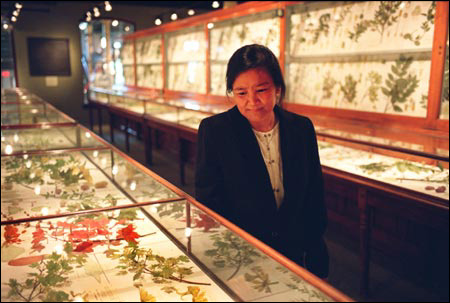Bhutanese fellow knows plants:
Botanist campaigns for preservation of native species in Bhutan

When botanist Rebecca Pradhan returns to her native country of Bhutan this month, she will put her Harvard fellowship to good use. Pradhan is committed to preserving one of Earth’s last remaining sanctuaries with pristine biodiversity – the forests of Bhutan.
Hired as a guide on a 2001 Himalayan trek organized by the Harvard Museum of Natural History Travel Program, Pradhan revealed floral splendors to 18 wide-eyed travelers that (they thought) only a gifted scientist with years of study could know. Yet Pradhan has had little formal training.
“Most of what I have learned is from nature,” said the 50-year-old botanist. “All the answers are there.”
Co-leader of the group Peter Ashton, the Charles Bullard Research Professor of Forestry, was impressed enough with Pradhan to encourage her to attend Harvard for clinical study. The suggestion wasn’t entirely altruistic: Bullard felt that Pradhan’s immense knowledge was vital to the future of Bhutan’s resources. Inspired by Ashton’s idea, the group raised more than $25,000 to finance two terms at Harvard, which Pradhan completed this spring.
John Constable, the other co-leader of the group, said that Pradhan has an almost mystical communion with plants. “She has a vast accumulation of botanical knowledge,” Constable said, “which will have significant influence on a country that already preserves its natural history heritage.”
Pradhan comes from a small village called Taba, four kilometers from Bhutan’s capital Thimphu. It was there, she explains, that her love of nature began at age 5 when her grandfather permitted her to plant one flower in his garden. Sadly, caterpillars consumed her plant in both its first and second years. “I wanted to give my flower some medicine to make the insects leave,” Pradhan said, “but my grandfather said it was unwise to disturb nature, and to wait and see what happened next year.”
She waited. To her delight, she spotted a warbler hopping on the ground near her plant the following spring. “My grandfather said: ‘Now child, this year you will get your flower.’”
Today she can easily recount the genus and species of over 90 percent of Bhutan’s plant life off the top of her head.
Pradhan has been studying nonstop since her arrival in Cambridge last fall. “There are so many things to know and learn,” she said. “I want to share this knowledge with people back home, to help people understand that our natural resources are all we have. It is our hard cash.”
Though one of the smallest and poorest countries of the world, Bhutan began a long-term conservation effort in 1971. Once centered over the shifting lower Eurasian Indian Plate 40 million years ago, Bhutan now hosts some of the richest biodiversity in Asia, including more than 5,400 species of flora. Nearly 70 percent of its terrain is covered in natural vegetation and forest, ranging from tropical in the south, to subalpine in the Himalayas, with variations of deciduous subtropical, mixed coniferous, and deciduous temperate and alpine in between.
Yet even with strong intentions to preserve its resources, Bhutan suffers from destructive agricultural practices such as poaching and deforestation, threatening extinction to some flora and fauna.
With her new-found knowledge from Harvard, Pradhan is determined to survey and document all plant life in Bhutan.
Senior Research Associate Stuart Davies, Pradhan’s adviser at Harvard, says her knowledge has already impacted conservation efforts. He ascribes her success to innate skill and passion. “It would be tragic if her information gets lost,” said Davies. “She is a good scientific connection in a place under great threat.”
Pradhan considers her time at Harvard just one of many important steps on her life’s path. Strongly Christian, Pradhan believes she was born to help keep her country’s resources intact. “Before I do something, I ask myself, Will this help future generations?” said Pradhan. “I never had the ambition to study at Harvard, but if one truly believes in what they are doing, their path opens.”




